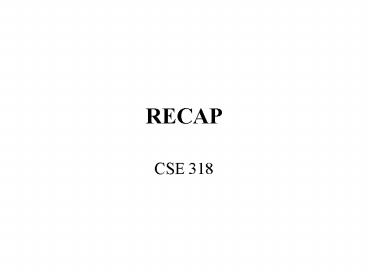RECAP PowerPoint PPT Presentation
Title: RECAP
1
RECAP
- CSE 318
2
Final Exam
- Cumulative
- Regular languages, automata 20
- Context-free languages, pushdown automata 20
- Turing machines, decidable, recognizable,
nondecidable languages 40 - (remaining 20 flexibility)
3
Two Key Questions
- What is computation?
- Non-deterministic computation
- What kinds of problems we can solve with
computation? - limits of computation
4
Computation
trans1
trans2
transn
conf1
conf2
.
confn
5
Examples
Finite automata
(q,0,p)
(p,0,f)
(s,1,q)
(s,100)
(f,e)
(p,0)
(q,00)
6
Nondetermistic Computation
- Theoretical (i.e., artificial) construct that
facilitates - Proving properties of computation
- Writing algorithms in a simplified form
trans1
conf2
conf1
Trans1
Conf2
.
7
Configuration
A configuration indicate the current state of the
computation
Configuration
Machine
Finite automata
Pushdown automata
Turing machines
8
Transitions
A transition indicates how the configurations are
transformed
Transition
Machine
Finite automata
(state, symbol, state)
Pushdown automata
((state, symbol, pop), (state,push))
Turing machines
((state, symbol, symbol), (state, ?/?))
9
Notion of Acceptance
Acceptance indicates what kinds of configurations
are considered successful computations
Configuration
Machine
Acceptance if
f accepting state, w e
(f,w)
Finite automata
f accepting state, w e
Pushdown automata
(f,w,?)
f accepting state
(f, w)
Turing machines
10
Machines versus Classes of Languages
Machine
Expressiveness Finite Automata
Pushdown Automata Turing Machines
Regular Languages
Context-free Languages
Decidable languages
11
Machine vs. n-stack NFA
Machine
n-stack NFA Finite Automata Pushdown
Automata Turing Machines
NFA 0 stacks
NFA 1 stack
NFA 2 stacks
12
Computation and Countability
- Surprisingly deep connection
- If a language L can be enumerated then it is
recognizable - To recognize if w is in L
- Print next string in L
- If w w then accept
- else goto 1
- And the other way around!
w
Enumerator of L
13
Problems that Can be Solved with Computation
Church-Turing Thesis
Algorithms Turing machines
Therefore, C, C, Prolog, Lisp, Small talk, and
Java programs can be simulated byTuring machines
14
Classes of Languages
(HALT)
Turing machines Pushdown Automata Finite
Automata
(ww w ??)
(Palindrome)
Regular languages
(ab)
PowerShow.com is a leading presentation sharing website. It has millions of presentations already uploaded and available with 1,000s more being uploaded by its users every day. Whatever your area of interest, here you’ll be able to find and view presentations you’ll love and possibly download. And, best of all, it is completely free and easy to use.
You might even have a presentation you’d like to share with others. If so, just upload it to PowerShow.com. We’ll convert it to an HTML5 slideshow that includes all the media types you’ve already added: audio, video, music, pictures, animations and transition effects. Then you can share it with your target audience as well as PowerShow.com’s millions of monthly visitors. And, again, it’s all free.
About the Developers
PowerShow.com is brought to you by CrystalGraphics, the award-winning developer and market-leading publisher of rich-media enhancement products for presentations. Our product offerings include millions of PowerPoint templates, diagrams, animated 3D characters and more.

